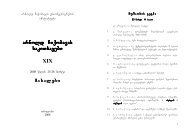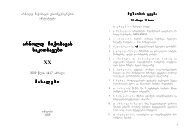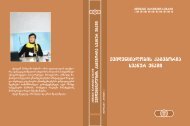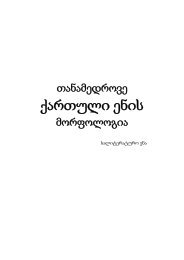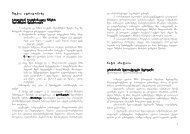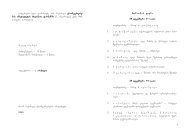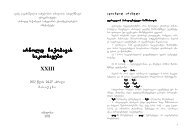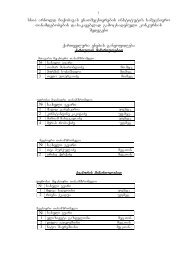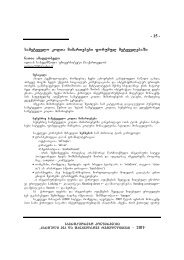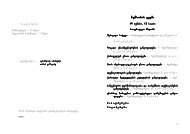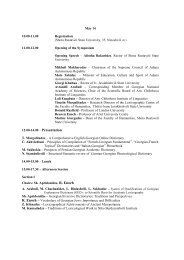5 r. a b a S i a (Tbilisi) bgeraTSesatyvisobis erTi rigisaTvis qarTvelur ...
5 r. a b a S i a (Tbilisi) bgeraTSesatyvisobis erTi rigisaTvis qarTvelur ...
5 r. a b a S i a (Tbilisi) bgeraTSesatyvisobis erTi rigisaTvis qarTvelur ...
Create successful ePaper yourself
Turn your PDF publications into a flip-book with our unique Google optimized e-Paper software.
guists take up the problem of the existence of the Future Tense in their own<br />
ways. Some of them think that forms of the Future Tense are formed by grammaticalization<br />
of the modal verbs shall and will which have modal meaning of<br />
intention or obligation. That’s why grammatical forms of the Future Tense can’t<br />
exist in English.<br />
In spite of the different opinions it can’t be denied that forms of the Future<br />
Tense express an action which refers to the Future, and the tendency to using<br />
of the form will for the 1 st person bring to the loss of meaning of the modal<br />
verbs. Therefore we can’t deny the existence of the forms of the Future Tense in<br />
English.<br />
There are two future forms in Dargwa: The Future Indicative Tense and<br />
The Future Suppositional Tense.<br />
At first there was only one form of the Present-Future Tense in Dargwa<br />
which could express either a present or a future action depending on the context.<br />
Later this form became the form of the Future Indicative Tense, e.g.: Nuni dursi<br />
ja„jal h´jadurdiris «I’ll do the homework tomorrow». Though sometimes this<br />
form is used to express recurrent or permanent actions in present, e.g.: Il nuSaCi<br />
har barh´i vaSar «He visits us every day».<br />
The Future Indicative Tense has no forms of perfective and imperfective<br />
aspect. The aspect can be expressed in the context, e.g.: iS juz nuni h´ed<br />
balTas «I’ll leave you this book» and nuni h´ed har barh´i iS STolixib Kawla<br />
buta balTas «I’ll leave you a piece of bread on this table every day». The same<br />
cases can be found in English. So the first and the second sentences correspond<br />
to the Future Indefinite Tense in English, e.g.: I’ll leave you this book. – I’ll leave<br />
you a piece of bread on this table every day.<br />
In some cases in Dargwa the differentiation of perfective and imperfective<br />
aspect forms is found in the Future Indicative Tense but it can be expressed by<br />
means of the difference of thematic vowels, prefixes, etc., e.g.: ejavKjas «will<br />
come» - vaSus «will go (regularly)»<br />
In English the perfective aspect is obviously expressed in the Future Perfect<br />
Tense which is used to show an action accomplished before a given future<br />
moment, e.g.: I’ll have come by 5 o’clock tomorrow. In Dargwa such sentences<br />
are rendered by means of Future Indicative forms, e.g.: iS hajanCi nuni bazla<br />
axirdis Tamanbinis «This work will have been finished by the end of the month».<br />
74



